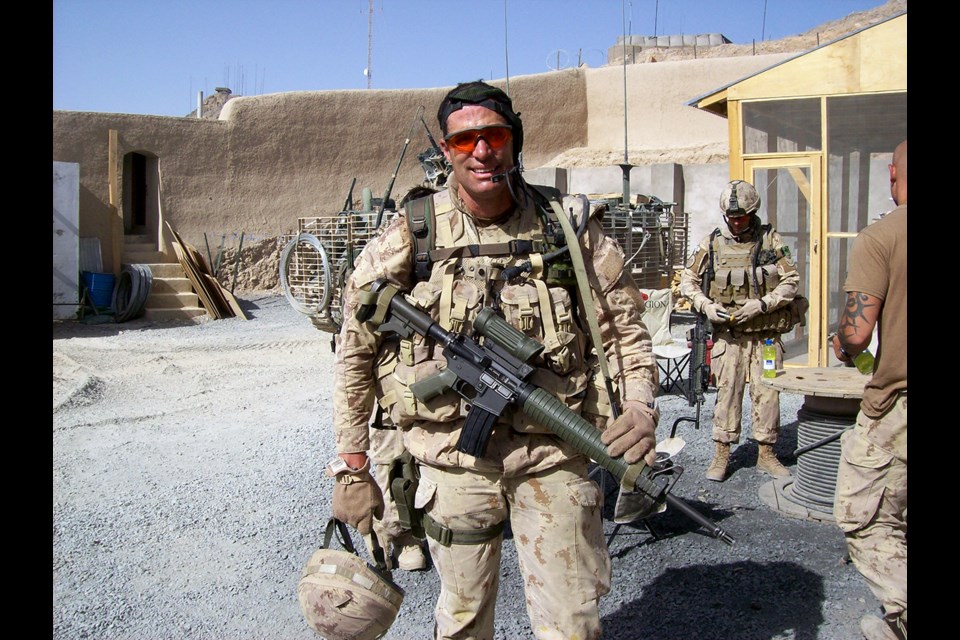Ray Wiss was 19 when he flunked out of his first year at university.
He looked around for a job, but couldn’t find anything that suited his interests.
He turned to the infantry, where he excelled in its recruitment course.
“The army gave me a second chance,” he recalled.
He left at 23, and became a member of the Canadian Forces Reserves while training as an emergency room doctor.
In Sudbury, Ont., his star rose: Wiss introduced ultrasound technology into Canada’s emergency medical practice, and he assisted the local SWAT team and with other policing activities.
But international theatres were never far from his mind.
Wiss, who was also deployed to Nicaragua in 1987 and, in 1993, to South Africa for the run-up to the presidential election, had read about terrorism groups like ISIS and Al Qaida, and he wasn’t surprised when they attacked the U.S. on Sept. 11, 2001.
And the more Wiss read, the more he wanted to make a difference, especially as Canadian troops started to land in Afghanistan.
In 2007, because he was an emergency medicine specialist with an infantry background, Wiss was fast-tracked to Afghanistan, with basic training waived.
At the time, Wiss was told he would run the emergency room at the Kandahar Air Field; however, once he got on site, a French–Canadian medic with the Royal 22nd Regiment (known as the Van Doos) was killed.
The Canadian Army tapped Wiss to take over as senior combat medic, a role his wife wasn’t too pleased with as he was now on the frontlines.
Dr. Wiss writes about his November 2007 to February 2008 tour — as well as his second round as a combat medic, from May to September 2009 — in two books:
- FOB Doc: A Doctor On the Front Lines in Afghanistan - A War Diary
- A Line in the Sand: Canadians at War in Kandahar (profits are donated to the Military Families Fund)
On Nov. 10, Wiss, the longest-serving combat doctor in the history of the Canadian Army, will speak about his experiences at a Remembrance Day service at Heritage Woods Secondary in Port Moody.
The Memory Project
After Wiss returned from Afghanistan, he signed up to be part of The Memory Project, an initiative by Historica Canada that arranges for veterans and Canadian Forces members to share stories about their military service.
Since 2001, its volunteer speakers have reached more than three million Canadians at schools and community events.
Wiss said he does a couple of presentations a year; last year, after moving to B.C. with his teenage daughters, he spoke at their high school in Maple Ridge.
His aim is to raise awareness about the good work of the Canadian Armed Forces.
“What vets want, and what those who suffered want, is not money or medals: What they want is for people to remember what they did for this country,” Wiss told the Tri-City News on Nov. 2.
“You don’t have to agree with the mission, but acknowledge that we fought to uphold values.”
Major (ret.) Wiss paid tribute to two Van Doos medics lost in Afghanistan while he was there: Corp. Nicholas Beauchamp and Master Corporal Christian Duchesne.
Wiss said he gets frustrated by Canadians who get confused by the Iraqi and Afghanistan wars; more than 40,000 Canadians served in Afghanistan, with 158 killed between 2001 and 2014.
“The most common statement I get after a speech is, ‘I had no idea.’ That was even true at the height of the war. It’s the thing that really bothers vets the most. You can have highly educated people, living in urban areas with lots of media… and they won’t even know what country we’re [fighting] in.”
Remembrance
With the Russian invasion of Ukraine this year, Wiss said his heart is with the service people and volunteers on the ground.
He would go to Ukraine to help “in a heartbeat,” but he promised his two daughters, after they lost their mother in a boating accident in 2012, that he “would never go to war again” unless Canada is directly attacked.
On Nov. 11, Wiss and his family will attend the Remembrance Day service at the cenotaph in Maple Ridge.
He understands why elderly veterans still weep, decades after they served.
“I feel the pain, the loss of my men,” he said, referring to Beauchamp and Duchesne. “The pain never gets better, but you make friends with the ghosts and the terror and the horror.”
Wiss believes today’s Afghanistan — now under Taliban rule following the withdrawal of the American troops on Aug. 30, 2021, after a 20-year occupation — has a long way to go.
Still, he’s hopeful given that the military coalition allowed girls to be educated. By the time Canadians left Afghanistan, there were three million girls in school.
“That’s one of our proudest achievements,” Wiss said.
For more information about The Memory Project in Canada and its resources, you can visit its website.





